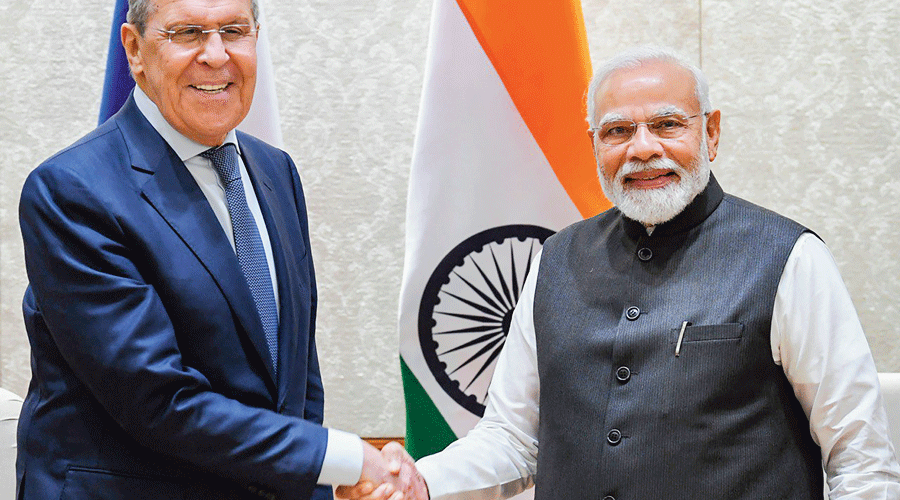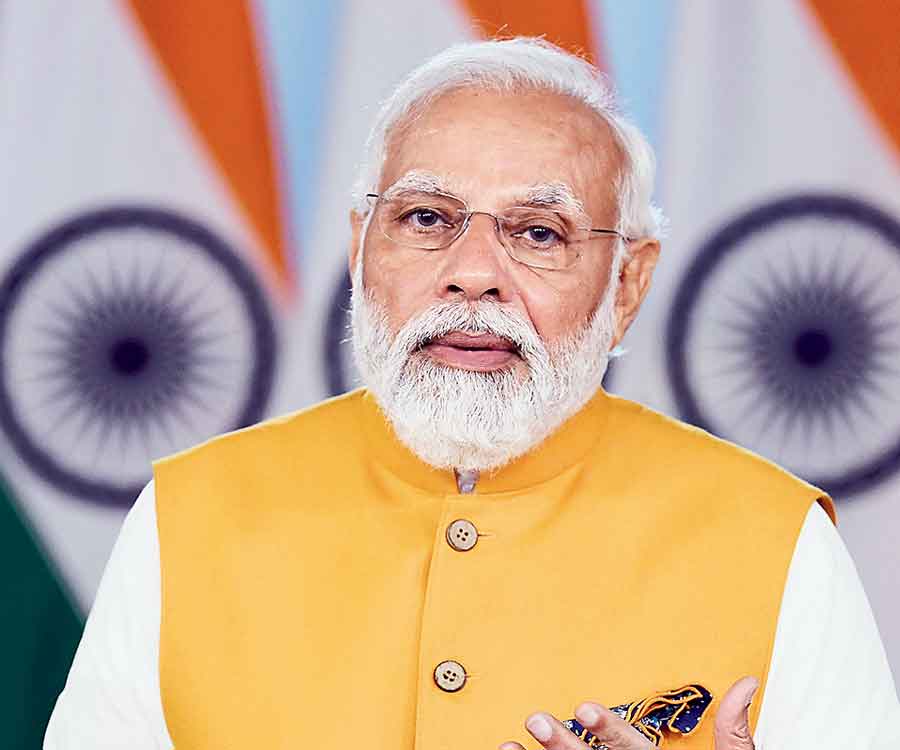Russian foreign minister Sergey Lavrov on Friday became the lone visiting overseas dignitary to secure a meeting with Prime Minister Narendra Modi in a week that witnessed multiple arrivals from western capitals, aimed at nudging New Delhi against doing business with Russia.
Russians had on Thursday first announced that such a meeting would take place. The Russian foreign ministry has posted photographs of the meeting.
India confirmed the meeting only on Friday morning and did not officially release any photograph of the meeting till late evening. However, much significance is being attached to Modi meeting Lavrov when India is under pressure to condemn Russia for attacking Ukraine and to distance itself from Moscow.
Lavrov wrapped up his 24-hour visit to Delhi after his meeting with Modi. According to the official readout, Lavrov briefed the Prime Minister on the Ukraine situation, including the ongoing peace negotiations.
Modi reiterated his call for an early cessation of violence and conveyed India’s readiness to contribute in any way to the peace efforts.
During his delegation-level meeting with external affairs minister S. Jaishankar and also at a news conference later, Lavrov appreciated India’s nuanced position on Ukraine, particularly given the pressure on it to condemn Russia and not do business with Moscow.
“We respect the fact that India’s foreign policy is built upon legitimate national interest,” Lavrov said to a question.
He mentioned Jaishankar’s remarks at an India-UK forum on Thursday where the Indian minister publicly differed with his British counterpart Liz Truss.
On using the rouble and rupee in bilateral financial trade dealings, Lavrov said that in its relations with India, China and several other countries, Russia had many years ago begun moving away from using the dollar and the euro and dealing in national currencies instead.
“Under the circumstances, this trend will be intensified, which is natural and obvious. We will be ready to supply to India any goods which India wants to buy. We have very good relations between the trade and finance ministries of the two countries,” Lavrov said.
Lavrov said: “And I have no doubt that a way will be found out to bypass the artificial impediments which illegal unilateral sanctions by the West have created. This also relates to military technical cooperation. We have no doubt that a solution will be found, and respective ministries are working on it.”
Lavrov said the shift from transactions in dollars and euros to those in national currencies was driven by the “unreliable nature” of the western partners.
“We don’t want to depend on a system which could be closed anytime and we don’t want to be dependent on a system whose masters can steal your money any time,” he said.
On the US pressure on India to become part of the “anti-Russia campaign”, Lavrov said such “blackmail” would not work.
“They don’t understand the national identity of the countries they are trying to talk to using blackmail,” he said.
On Thursday, the US had warned India of consequences if it increased its energy imports from Russia, adding that New Delhi could not expect Moscow to come to its defence against China.
India argues that its decision-making is governed by national interest. At the policy level, India has traditionally been averse to unilateral sanctions.
In his opening remarks at the delegation-level meeting, Jaishankar said: “Our meeting today takes place in a difficult international environment quite apart from the pandemic. India, as you are aware, has always been in favour of resolving differences and disputes through dialogue and diplomacy.”
According to the external affairs ministry, the two sides considered the implications of recent developments on trade and economic relations.
Jaishankar, the statement said, underlined that “as a developing economy, global volatility in different domains is of particular concern to India”, and added that it was important for both countries that their economic, technological and people-to-people contacts remained stable and predictable.
Lavrov provided Russia’s perspective on the situation.
At the news conference after his meeting with Jaishankar, Lavrov praised India for not taking a “one-sided” view of the Ukraine situation.
“We are friends,” Lavrov said, adding that India saw the Ukraine crisis in the “entirety of facts and not just in a one-sided way”.
Lavrov said Moscow would be open to India mediating between Ukraine and Russia but he had not heard of any such proposal.
He said there had been some movement forward in the negotiations with Ukraine.
“Non-nuclear, non-bloc, neutral status — it is now being recognised as absolutely necessary,” he said.
India has bought millions of barrels of crude oil from Russia at a discount since the war erupted, justifying the purchases as beneficial for its citizens and something that even European countries are doing.
Finance minister Nirmala Sitharaman told CNBC-TV18 that India would continue to buy discounted oil from Russia.
“I would put my country’s national interests first and I would put my energy security first,” she said. “Why should I not buy it? I need it for my people.”
India has also contracted to buy sunflower oil from Russia at a record high price after supplies from Ukraine stopped.
Additional reporting by Reuters












